Thursday, March 27, 2025. Annette’s Roundup for Democracy.
The breach that won’t go away.
BREAKING: Jeffrey Goldberg from the Atlantic has released the entire chat of the Signal group where the highest U.S. officials discuss war plans.
— CALL TO ACTIVISM (@CalltoActivism) March 26, 2025
The Atlantic redacted the name of a CIA agent. They care more about his life than Ratcliffe does.
Tulsi Gabbard lied under oath. pic.twitter.com/TEhIAMLWBf
Here Are the Attack Plans That Trump’s Advisers Shared on Signal - from Jeffrey Goldberg, at The Atlantic
The administration has downplayed the importance of the text messages inadvertently sent to The Atlantic’s editor in chief.
By Jeffrey Goldberg and Shane Harris
So, about that Signal chat.
On Monday, shortly after we published a story about a massive Trump-administration security breach, a reporter asked the secretary of defense, Pete Hegseth, why he had shared plans about a forthcoming attack on Yemen on the Signal messaging app. He answered, “Nobody was texting war plans. And that’s all I have to say about that.”
At a Senate hearing yesterday, the director of national intelligence, Tulsi Gabbard, and the director of the Central Intelligence Agency, John Ratcliffe, were both asked about the Signal chat, to which Jeffrey Goldberg, the editor in chief of The Atlantic, was inadvertently invited by National Security Adviser Michael Waltz. “There was no classified material that was shared in that Signal group,” Gabbard told members of the Senate Intelligence Committee.
Ratcliffe said much the same: “My communications, to be clear, in the Signal message group were entirely permissible and lawful and did not include classified information.”
President Donald Trump, asked yesterday afternoon about the same matter, said, “It wasn’t classified information.”
These statements presented us with a dilemma. In The Atlantic’s initial story about the Signal chat—the “Houthi PC small group,” as it was named by Waltz—we withheld specific information related to weapons and to the timing of attacks that we found in certain texts. As a general rule, we do not publish information about military operations if that information could possibly jeopardize the lives of U.S. personnel. That is why we chose to characterize the nature of the information being shared, not specific details about the attacks.
The statements by Hegseth, Gabbard, Ratcliffe, and Trump—combined with the assertions made by numerous administration officials that we are lying about the content of the Signal texts—have led us to believe that people should see the texts in order to reach their own conclusions. There is a clear public interest in disclosing the sort of information that Trump advisers included in nonsecure communications channels, especially because senior administration figures are attempting to downplay the significance of the messages that were shared.
Experts have repeatedly told us that use of a Signal chat for such sensitive discussions poses a threat to national security. As a case in point, Goldberg received information on the attacks two hours before the scheduled start of the bombing of Houthi positions. If this information—particularly the exact times American aircraft were taking off for Yemen—had fallen into the wrong hands in that crucial two-hour period, American pilots and other American personnel could have been exposed to even greater danger than they ordinarily would face. The Trump administration is arguing that the military information contained in these texts was not classified—as it typically would be—although the president has not explained how he reached this conclusion.
Yesterday, we asked officials across the Trump administration if they objected to us publishing the full texts. In emails to the Central Intelligence Agency, the Office of the Director of National Intelligence, the National Security Council, the Department of Defense, and the White House, we wrote, in part: “In light of statements today from multiple administration officials, including before the Senate Intelligence Committee, that the information in the Signal chain about the Houthi strike is not classified, and that it does not contain ‘war plans,’ The Atlantic is considering publishing the entirety of the Signal chain.”
We sent our first request for comment and feedback to national-security officials shortly after noon, and followed up in the evening after most failed to answer.
Late yesterday, White House Press Secretary Karoline Leavitt emailed a response: “As we have repeatedly stated, there was no classified information transmitted in the group chat. However, as the CIA Director and National Security Advisor have both expressed today, that does not mean we encourage the release of the conversation. This was intended to be a an [sic] internal and private deliberation amongst high-level senior staff and sensitive information was discussed. So for those reason [sic] — yes, we object to the release.” (The Leavitt statement did not address which elements of the texts the White House considered sensitive, or how, more than a week after the initial air strikes, their publication could have bearing on national security.)
A CIA spokesperson asked us to withhold the name of John Ratcliffe’s chief of staff, which Ratcliffe had shared in the Signal chain, because CIA intelligence officers are traditionally not publicly identified. Ratcliffe had testified earlier yesterday that the officer is not undercover and said it was “completely appropriate” to share their name in the Signal conversation. We will continue to withhold the name of the officer. Otherwise, the messages are unredacted.
As we wrote on Monday, much of the conversation in the “Houthi PC small group” concerned the timing and rationale of attacks on the Houthis, and contained remarks by Trump-administration officials about the alleged shortcomings of America’s European allies. But on the day of the attack—Saturday, March 15—the discussion veered toward the operational.
At 11:44 a.m. eastern time, Hegseth posted in the chat, in all caps, “TEAM UPDATE:”
The text beneath this began, “TIME NOW (1144et): Weather is FAVORABLE. Just CONFIRMED w/CENTCOM we are a GO for mission launch.” Centcom, or Central Command, is the military’s combatant command for the Middle East. The Hegseth text continues:
“1215et: F-18s LAUNCH (1st strike package)”
“1345: ‘Trigger Based’ F-18 1st Strike Window Starts (Target Terrorist is @ his Known Location so SHOULD BE ON TIME – also, Strike Drones Launch (MQ-9s)”
Let us pause here for a moment to underscore a point. This Signal message shows that the U.S. secretary of defense texted a group that included a phone number unknown to him—Goldberg’s cellphone—at 11:44 a.m. This was 31 minutes before the first U.S. warplanes launched, and two hours and one minute before the beginning of a period in which a primary target, the Houthi “Target Terrorist,” was expected to be killed by these American aircraft. If this text had been received by someone hostile to American interests—or someone merely indiscreet, and with access to social media—the Houthis would have had time to prepare for what was meant to be a surprise attack on their strongholds. The consequences for American pilots could have been catastrophic.
The Hegseth text then continued:
“1410: More F-18s LAUNCH (2nd strike package)”
“1415: Strike Drones on Target (THIS IS WHEN THE FIRST BOMBS WILL DEFINITELY DROP, pending earlier ‘Trigger Based’ targets)”
“1536 F-18 2nd Strike Starts – also, first sea-based Tomahawks launched.”
“MORE TO FOLLOW (per timeline)”
“We are currently clean on OPSEC”—that is, operational security.
“Godspeed to our Warriors.”
Shortly after, Vice President J. D. Vance texted the group, “I will say a prayer for victory.”
At 1:48 p.m., Waltz sent the following text, containing real-time intelligence about conditions at an attack site, apparently in Sanaa: “VP. Building collapsed. Had multiple positive ID. Pete, Kurilla, the IC, amazing job.” Waltz was referring here to Hegseth; General Michael E. Kurilla, the commander of Central Command; and the intelligence community, or IC. The reference to “multiple positive ID” suggests that U.S. intelligence had ascertained the identities of the Houthi target, or targets, using either human or technical assets.
Six minutes later, the vice president, apparently confused by Waltz’s message, wrote, “What?”
At 2 p.m., Waltz responded: “Typing too fast. The first target – their top missile guy – we had positive ID of him walking into his girlfriend’s building and it’s now collapsed.”
Vance responded a minute later: “Excellent.” Thirty-five minutes after that, Ratcliffe, the CIA director, wrote, “A good start,” which Waltz followed with a text containing a fist emoji, an American-flag emoji, and a fire emoji. The Houthi-run Yemeni health ministry reported that at least 53 people were killed in the strikes, a number that has not been independently verified.
Later that afternoon, Hegseth posted: “CENTCOM was/is on point.” Notably, he then told the group that attacks would be continuing. “Great job all. More strikes ongoing for hours tonight, and will provide full initial report tomorrow. But on time, on target, and good readouts so far.”
It is still unclear why a journalist was added to the text exchange. Waltz, who invited Goldberg into the Signal chat, said yesterday that he was investigating “how the heck he got into this room.”
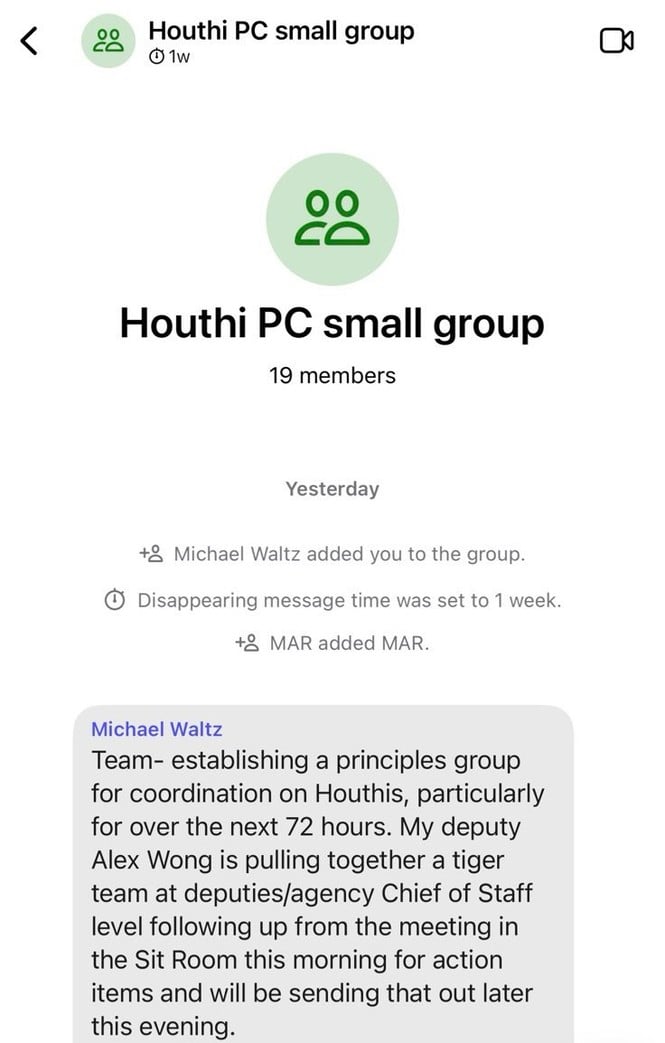
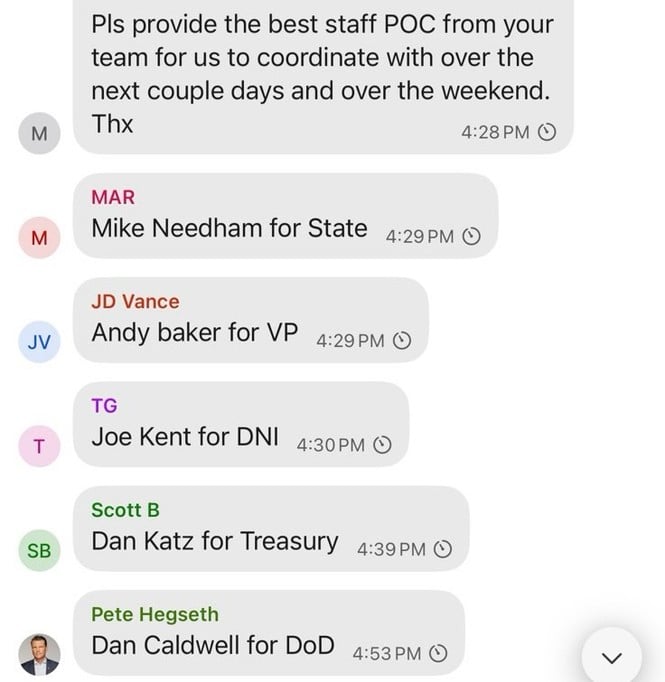
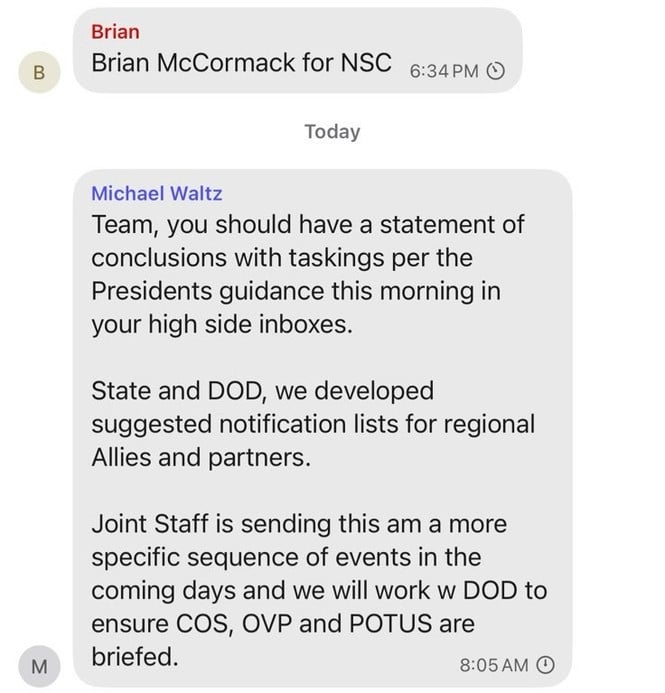
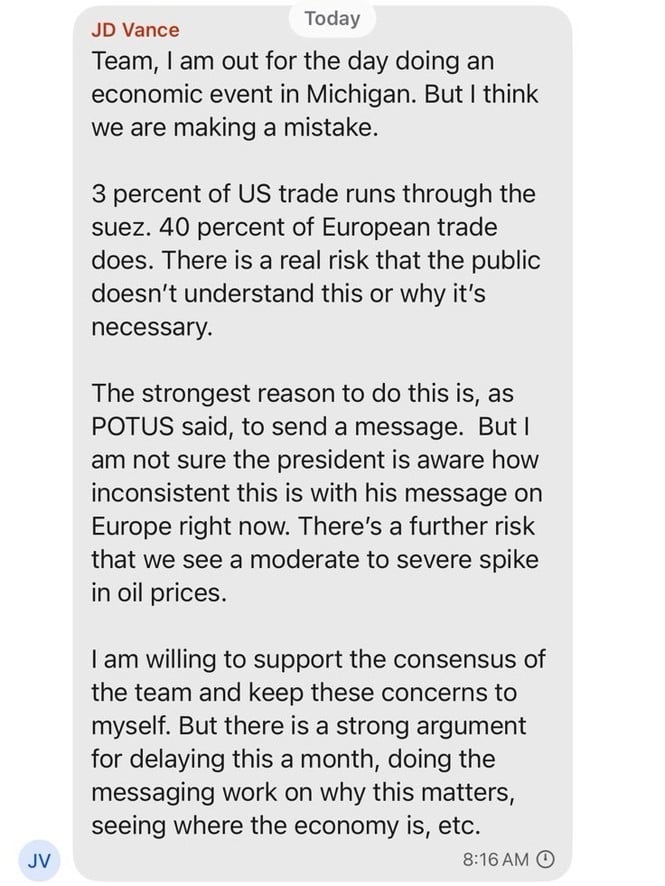
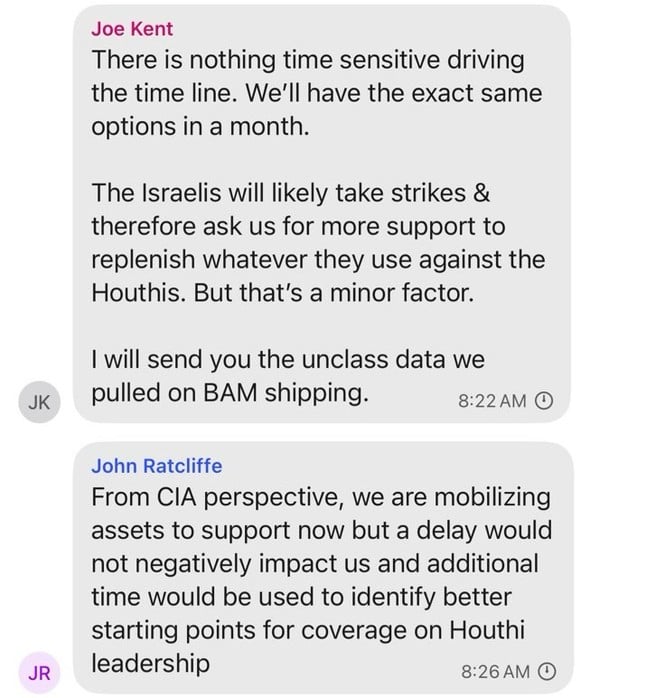
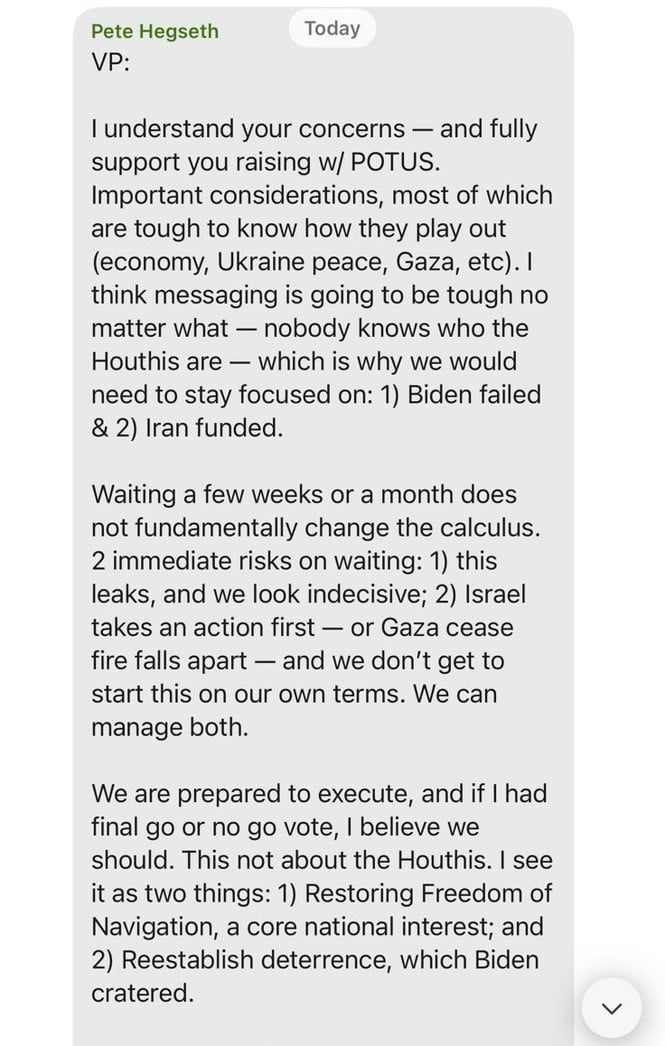
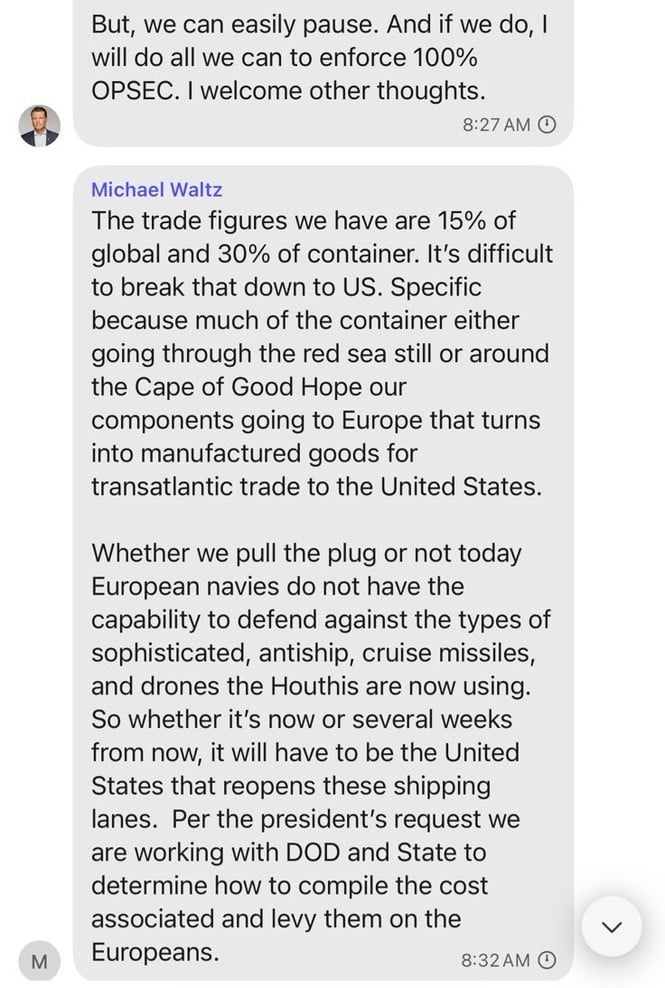
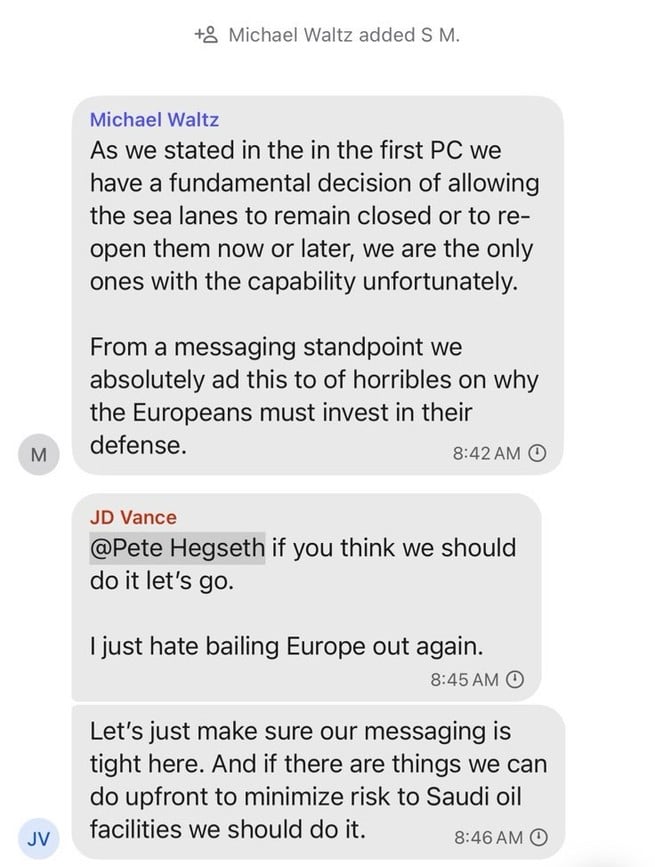

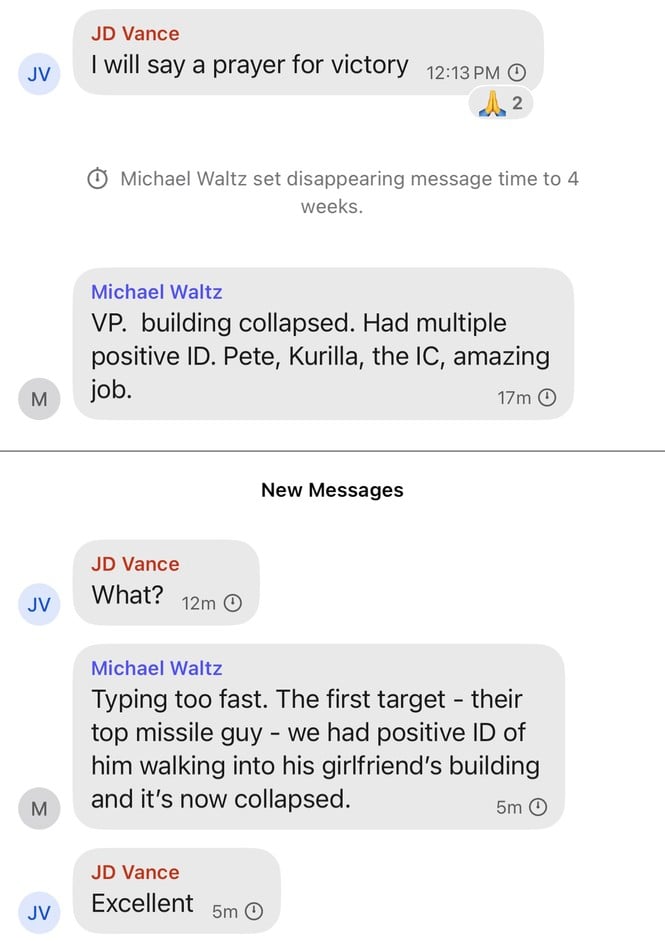
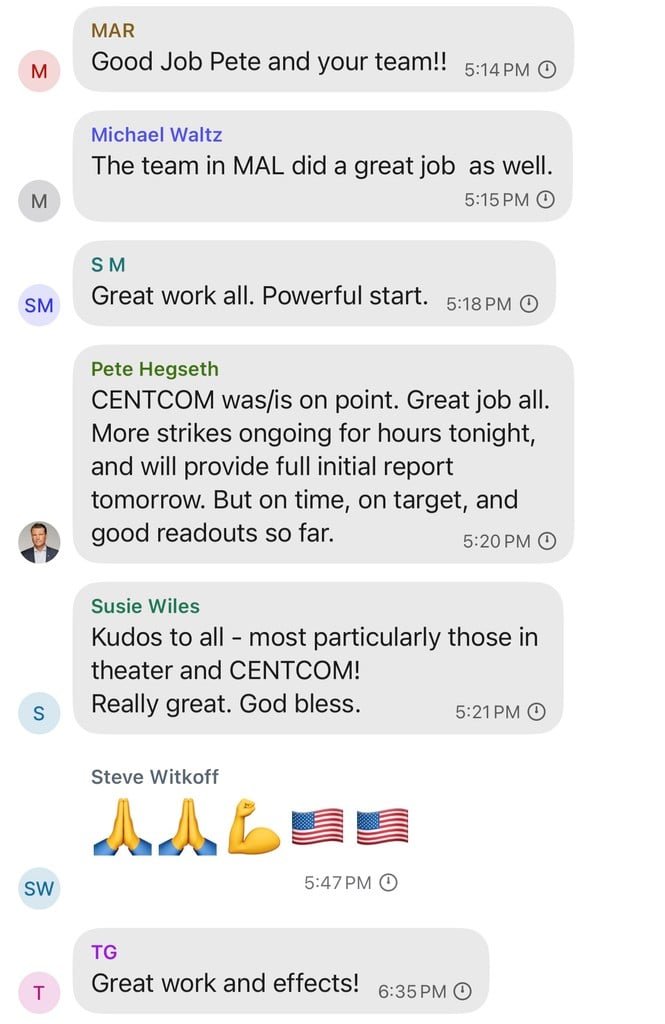
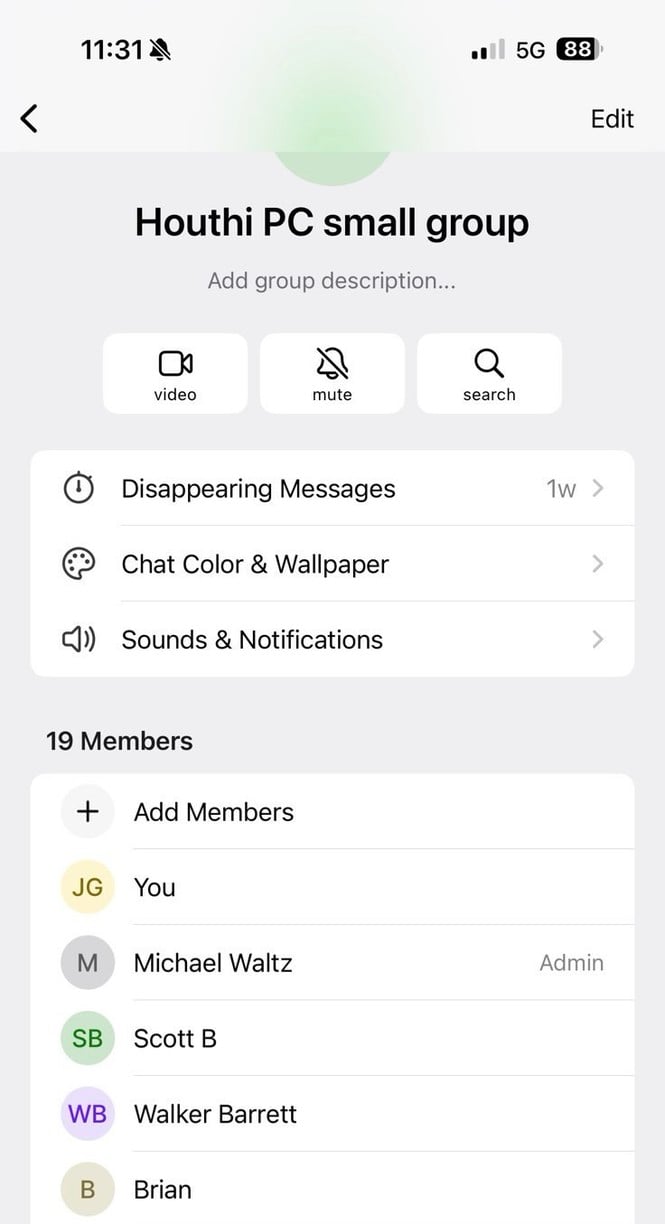
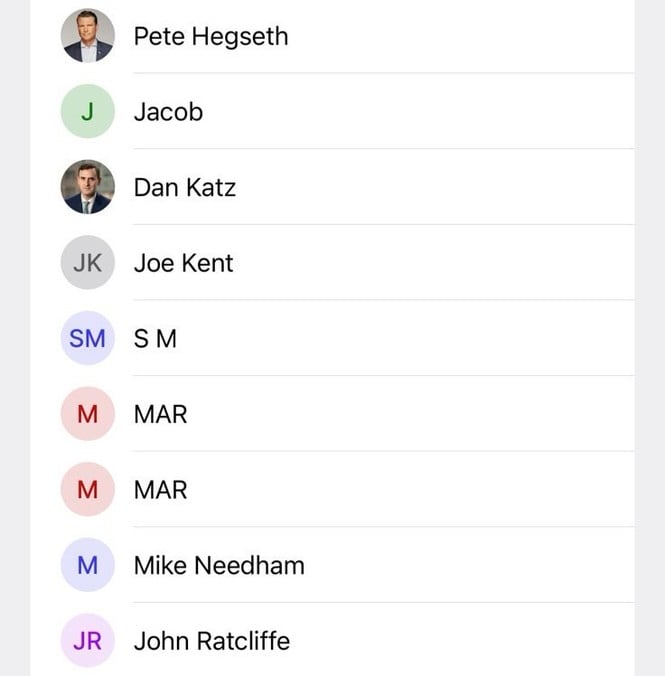
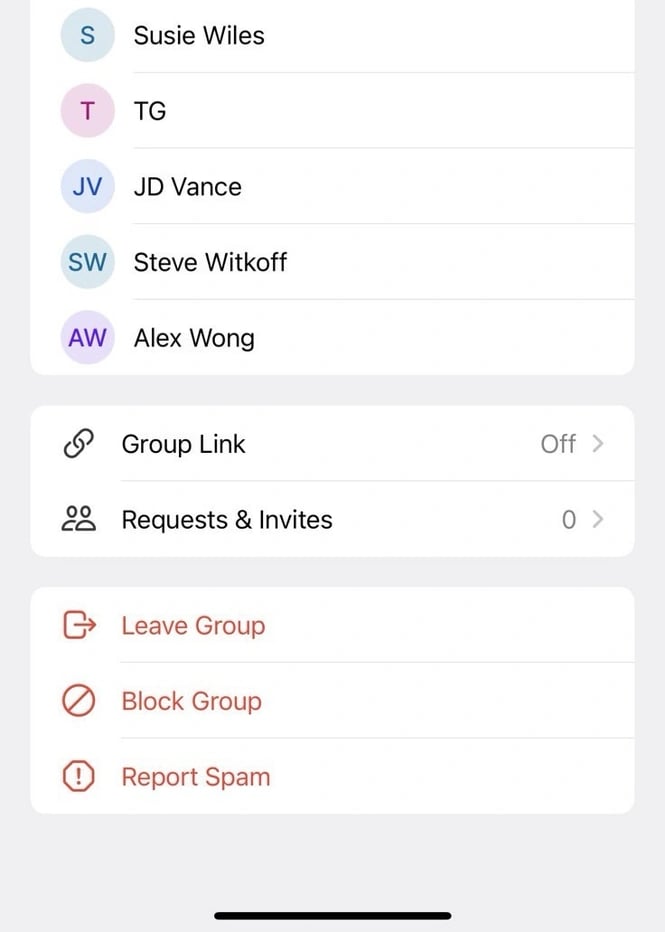
A well-stated summary of the dangerous behavior by those in Trump’s cabinet expected to provide security to our country and our military.
Those Are Definitely ‘War Plans.’
“We are currently clean on OPSEC,” Defense Secretary Pete Hegseth texted to his pals at the highest levels of the Trump administration, just before U.S. forces dropped bombs on Yemen, according to new details released by The Atlantic on Wednesday morning. OPSEC stands for “operational security,” and Hegseth’s assurance was stunningly false, since none of the gang discussing the attack had bothered to question why someone named J.G. (the initials of Jeff Goldberg, the magazine’s editor) was right there in the group chat with them.
The new texts released by The Atlantic make it clear that members of the administration’s highest echelon — including Vice President JD Vance and John Ratcliffe, the C.I.A. director — not only are terrible at operational security but also seem to have a vast disregard for the inconveniences that true security requires. For the past two days, in fact, it has become obvious that the administration’s definition of OPSEC is very different from a regular person’s. To the White House, the term means only one thing: bending reality — by lying, sneering and stonewalling — so that the official narrative of this embarrassment makes an innocent administration the victim of a left-wing media conspiracy.
“This entire story was another hoax written by a Trump-hater who is well-known for his sensationalist spin,” wrote Karoline Leavitt, the White House press secretary, on social media Wednesday morning. The Atlantic had conceded, she said, that “these were NOT ‘war plans.’”
The Atlantic conceded no such thing. It used the phrase “attack plans” in its headline, and anyone reading Hegseth’s boastful, frat-boy description of what American service members were about to do can have no doubt that he revealed secret military details. “‘Trigger Based’ F-18 1st Strike Window Starts (Target Terrorist is @ his Known Location so SHOULD BE ON TIME — also, Strike Drones Launch (MQ-9s),” he wrote. This was roughly half an hour before the first warplanes took off, and a few minutes later he told the group that a group of sea-based Tomahawk missiles had been launched — all invaluable information to an enemy, including the exact time and nature of the attacks. After the assault was over, he told the group that the U.S. had a positive ID of a Houthi leader walking into a building that was bombed.
And yet the White House continued to insist that nothing unusual had happened, as if the sky were blue during a hurricane. “No locations,” wrote Michael Waltz, the national security adviser, who was responsible for inviting Goldberg into the chat. “No sources & methods. NO WAR PLANS.” From President Trump to Tulsi Gabbard, the director of national intelligence, everyone insisted that there was nothing classified or even particularly sensitive about the information in the chat, leading Goldberg and his colleagues to reconsider their careful decision on Monday not to publish the military details that Hegseth had texted. Rather than acknowledge the discretion of the editors, White House officials said the newly released texts showed that the magazine had been lying all along. “What scumbags!” wrote Taylor Budowich, the deputy chief of staff.
Normally, the F.B.I. would already be looking into this security breach, but that isn’t going to happen under Trump’s lackey director, Kash Patel, and the White House can probably prevail on congressional Republicans not to conduct hearings or a proper investigation. But what members of the administration can no longer effectively do is pretend that their incompetent and reckless actions didn’t happen. It’s all there in black and white and in childish strong-arm emojis, and history will not be fooled by their cheap attempt to edit the facts. (David Firestone, Editorial Board member, The New York Times).
One more thing.
Remember when serious people gathered in the Situation Room, making a decision which risked the lives of American military men, as well as the dangerous war criminal, Osama bin Laden, and others.
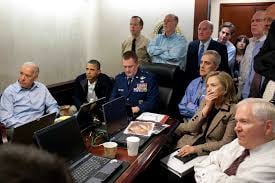
Whose head should roll?
As President Harry Truman said, the buck should stop with the man who sits behind the desk in the Oval Office. He chose the clowns who breached security in the Signal War Plans Scandal.
But next on the list would certainly be former Fox Presenter turned Secretary of Defense Pete Hegseth.
He just keeps showing he is not up to the job.
As Democratic Representative Jim Himes of Connecticut said at the hearing with top Trump intelligence officials on Wednesday, “It’s by the awesome grace of God that we are not mourning dead pilots right now.”
Do we have to have caskets in front of us to demand action?
Read more about Hegseth since he was confirmed by a 50-50 vote with J.D.Vance’s tie breaking vote pushing him through.👇
Signal Leak is Latest Mistake in Pete Hegseth’s Rocky Times as Defense Secretary.

Even before he disclosed secret battle plans for Yemen in a group chat, information that could have endangered American fighter pilots, it had been a rocky two months for Defense Secretary Pete Hegseth.
Mr. Hegseth, a former National Guard infantryman and Fox News weekend host, started his job at the Pentagon determined to out-Trump President Trump, Defense Department officials and aides said.
The president is skeptical about the value of NATO and European alliances, so the Pentagon under Mr. Hegseth considered plans in which the United States would give up its command role overseeing NATO troops. After Mr. Trump issued executive orders targeting transgender people, Mr. Hegseth ordered a ban on transgender troops.
Mr. Trump has embraced Elon Musk, the billionaire chief executive of SpaceX and Tesla. The Pentagon planned a sensitive briefing to give Mr. Musk a firsthand look at how the military would fight a war with China, a potentially valuable step for any businessman with interests there.
In all of those endeavors, Mr. Hegseth was pulled back, by congressional Republicans, the courts or even Mr. Trump.
The president made clear last Friday that he had been caught by surprise by a report in The New York Times on the Pentagon’s briefing for Mr. Musk, who oversees an effort to shrink the government, but also denied that the meeting had been planned.
“I don’t want to show that to anybody, but certainly you wouldn’t show it to a businessman who is helping us so much,” Mr. Trump said.
But Mr. Hegseth’s latest mistake could have led to catastrophic consequences.
On Monday, the editor in chief of The Atlantic magazine, Jeffrey Goldberg, wrote that he had been inadvertently included in an encrypted group chat in which Mr. Hegseth discussed plans for targeting the Houthi militia in Yemen two hours before U.S. troops launched attacks against the group.
The White House confirmed Mr. Goldberg’s account. But Mr. Hegseth later denied that he put war plans in the group chat, which apparently included other senior members of Mr. Trump’s national security team.
In disclosing the aircraft, targets and timing for hitting Houthi militia sites in Yemen on the commercial messaging app Signal, Mr. Hegseth risked the lives of American war fighters.
Across the military on Monday and Tuesday, current and retired troops and officers expressed dismay and anger in social media posts, secret chat groups and the hallways of the Pentagon.
“My father was killed in action flying night-trail interdiction over the Ho Chi Minh Trail” after a North Vietnamese strike, said the retired Maj. Gen. Paul D. Eaton, who served in the Iraq war. “And now, you have Hegseth. He has released information that could have directly led to the death of an American fighter pilot.”
It was unclear on Tuesday whether anyone involved in the Signal group chat would lose their jobs. Republicans in Congress have been wary of running afoul of Mr. Trump. But Senator Roger Wicker, Republican of Mississippi and the chairman of the Armed Services Committee, indicated on Monday that there would be some kind of investigation.
John R. Bolton, a national security adviser in the first Trump administration, said on social media that he doubted that “anyone will be held to account for events described by The Atlantic unless Donald Trump himself feels the heat.”
It was unclear on Tuesday whether anyone involved in the Signal group chat would lose their jobs. Republicans in Congress have been wary of running afoul of Mr. Trump. But Senator Roger Wicker, Republican of Mississippi and the chairman of the Armed Services Committee, indicated on Monday that there would be some kind of investigation.
John R. Bolton, a national security adviser in the first Trump administration, said on social media that he doubted that “anyone will be held to account for events described by The Atlantic unless Donald Trump himself feels the heat.”
“Secretary Hegseth is trying to figure out where the president’s headed, and to run there ahead of him,” said Kori Schake, a national security expert at the American Enterprise Institute. But, she added, “he’s doing performative activities. He’s not yet demonstrated that he’s running the department.”
Peter Feaver, a political science professor at Duke University who has studied the military for decades, said the Signal chat disclosure “raises serious questions about how a new accountability standard might apply: How would he handle a situation like this if it involved one of his subordinates?”
On Monday, Mr. Hegseth left for Asia, his first trip abroad since a foray to Europe last month in which he was roundly criticized for going further on Ukraine than his boss had at the time. He posted a video on social media of himself guarded by two female airmen in full combat gear as he boarded the plane at Joint Base Andrews. The show of security was remarkable. Not even the president is guarded that way as he boards Air Force One.
When he landed in Hawaii several hours later, Mr. Hegseth criticized Mr. Goldberg as a “so-called journalist” and asserted that “nobody was texting war plans, and that’s all I have to say about that.”
Mr. Hegseth’s stumbles started soon after he was sworn in to lead the Pentagon on Jan. 25.
In his debut on the world stage in mid-February, he told NATO and Ukrainian ministers that a return to Ukraine’s pre-2014 borders, before Russia’s first invasion, was “an unrealistic objective” and ruled out NATO membership for Ukraine. A few hours later, Mr. Trump backed him up while announcing a phone call with President Vladimir V. Putin of Russia to begin peace negotiations.
Facing blowback the next day from European allies and President Volodymyr Zelensky of Ukraine, Mr. Hegseth denied that either he or Mr. Trump had sold out Ukraine. “There is no betrayal there,” Mr. Hegseth said.
That was not how even Republican supporters of Mr. Hegseth saw it. “He made a rookie mistake in Brussels,” Mr. Wicker said about the secretary’s comment on Ukraine’s borders.
“I don’t know who wrote the speech — it is the kind of thing Tucker Carlson could have written, and Carlson is a fool,” Mr. Wicker said, referring to the conservative media personality and former Fox News host.
Mr. Hegseth sought to recover later in the week, saying he had simply been trying to “introduce realism into the expectations of our NATO allies.” How much territory Ukraine may cede to Russia would be decided in talks between Mr. Trump and the presidents of the warring countries, he said.

Mr. Hegseth and his wife, Jennifer Rauchet, attending a military ceremony in Warsaw. Mr. Hegseth tried to walk back his previous remarks on Ukraine later in that February.
Last week, Mr. Hegseth again got crosswise with Mr. Wicker over reports that the Trump administration was planning to withdraw from NATO’s military command and reduce the number of troops deployed overseas in addition to other changes to the military’s combatant commands.
Mr. Wicker and Representative Mike Rogers, Republican of Alabama and the chairman of the House Armed Services Committee, said in a statement that they were concerned about reports that the Defense Department might be planning changes “absent coordination with the White House and Congress.”
Other signs point to a dysfunctional Pentagon on Mr. Hegseth’s watch.
Last week, the Defense Department removed an online article about the military background of Jackie Robinson, who became the first African American to play in Major League Baseball in 1947, after serving in the Army.
The article — which reappeared after a furor — was one in a series of government web pages on Black figures that have vanished under the Trump administration’s efforts to purge government websites of references to diversity and inclusion.
In response to questions about the article, John Ullyot, a Pentagon spokesman, said in a statement that “D.E.I. is dead at the Defense Department,” referring to diversity, equity and inclusion efforts. He added that he was pleased with the department’s “rapid compliance” with a directive ordering that diversity-related content be removed from all platforms.
Mr. Ullyot was removed from his position shortly afterward.
Sean Parnell, the chief Pentagon spokesman, said in a video that the screening of Defense Department content for “D.E.I. content” was “an incredibly important undertaking,” but he acknowledged mistakes were made.
The Pentagon leadership under Mr. Trump expressed its disdain for the military’s decades-long efforts to diversify its ranks. Last month, Mr. Hegseth said that the “single dumbest phrase in military history is ‘our diversity is our strength.’”
Mr. Hegseth also came under sharp critique from the federal judge handling a lawsuit against his efforts to ban transgender troops. “The military ban is soaked in animus and dripping with pretext,” Judge Ana C. Reyes of U.S. District Court in Washington wrote in a scathing ruling last week.
“Its language is unabashedly demeaning, its policy stigmatizes transgender persons as inherently unfit and its conclusions bear no relation to fact,” she wrote in her decision temporarily blocking the ban. “Seriously? These were not off-the-cuff remarks at a cocktail party.” (Front page of the New York digital Times, March 26, 2025.)
Signal lawsuit assigned to judge who ruled against Trump deportations
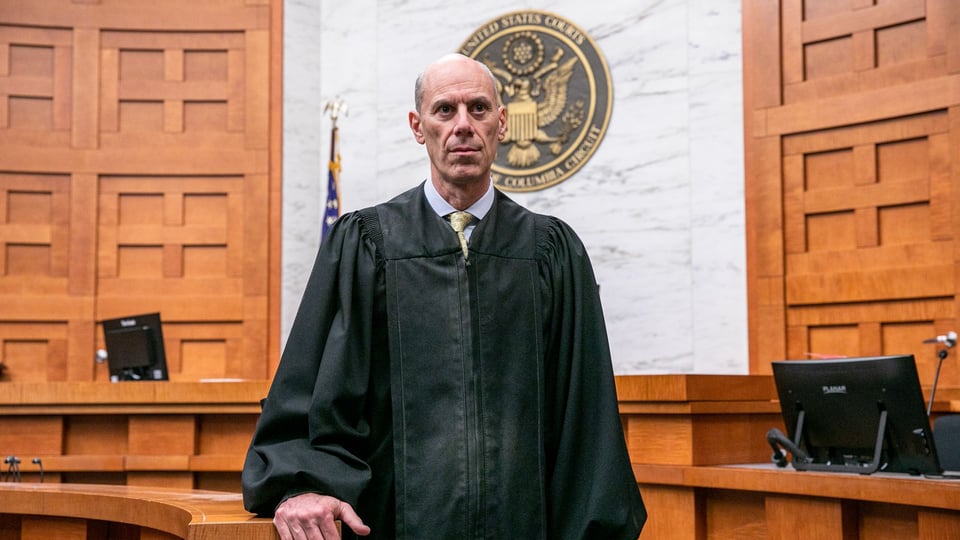
The federal judge Republicans want to impeach for blocking deportation flights to El Salvador will handle a new lawsuit alleging Trump officials violated federal law by discussing an attack on Yemen in a Signal chat.
Driving the news: U.S. District Judge James Boasberg was assigned to the lawsuit brought by watchdog group American Oversight alleging Defense Secretary Pete Hegseth and other officials violated the Federal Records Act.
The new lawsuit alleges that Trump officials' use of a platform that allows messages about government business to be erased is a violation of record retention laws.
Catch up quick: The Signal group chat became public after Jeffrey Goldberg, editor-in-chief of The Atlantic, was inadvertently added.
The White House has acknowledged the chat took place, but denied that any "classified materials" or "war plans" were discussed.
The intrigue: Boasberg has already faced the Trump administration's wrath after he ordered deportation flights containing alleged members of a Venezuelan gang to return to the U.S.
The Trump administration defied his order, arguing it came after the flights were already over international waters.
Boasberg slammed the Trump administration for issuing the deportation order "in the dark" to skirt potential legal challenges.
Republicans moved quickly to impeach Boasberg after Trump in a social media post attacked him and other "Crooked Judges."
Trump's outburst drew a rare public rebuke from Supreme Court Chief Justice John Roberts.
Go deeper: Trump's border czar: "I don't care what the judges think" (Axios)
One more thing.
Not only aren’t the Trump appointees up to the job of keeping America safe, they can’t even protect their own information.
Donald Trump's most important security advisers used Signal to discuss an imminent military strike. Now, reporting by DER SPIEGEL has found that the contact data of some of those officials, including mobile phone numbers, is freely accessible on the internet.
Hegseth, Waltz, Gabbard: Private Data and Passwords of Senior U.S. Security Officials Found Online - DER SPIEGEL

U.S. Secretary of Defense Pete Hegseth: His contact info could be found using a commercial people finder.
Private contact details of the most important security advisers to U.S. President Donald Trump can be found on the internet. DER SPIEGEL reporters were able to find mobile phone numbers, email addresses and even some passwords belonging to the top officials.
To do so, the reporters used commercial people search engines along with hacked customer data that has been published on the web. Those affected by the leaks include National Security Adviser Mike Waltz, Director of National Intelligence Tulsi Gabbard and Secretary of Defense Pete Hegseth.
Most of these numbers and email addresses are apparently still in use, with some of them linked to profiles on social media platforms like Instagram and LinkedIn. They were used to create Dropbox accounts and profiles in apps that track running data. There are also WhatsApp profiles for the respective phone numbers and even Signal accounts in some cases.
As such, the reporting has revealed an additional grave, previously unknown security breach at the highest levels in Washington. Hostile intelligence services could use this publicly available data to hack the communications of those affected by installing spyware on their devices. It is thus conceivable that foreign agents were privy to the Signal chat group in which Gabbard, Waltz and Hegseth discussed a military strike.
Numbers Linked to Signal Accounts
It remains unclear, however, whether this extremely problematic chat was conducted using Signal accounts linked to the private telephone numbers of the officials involved. Tulsi Gabbard has declined to comment. DER SPIEGEL reporting has demonstrated, though, that privately used and publicly accessible telephone numbers belonging to her and Waltz are, in fact, linked to Signal accounts.
The U.S. newsmagazine The Atlantic revealed on Monday that Gabbard, Waltz and Hegseth, along with CIA Director John Ratcliffe and additional officials, discussed an imminent military strike against the Houthi militia in Yemen in a Signal chat. The information shared among the participants included intelligence information and precise attack plans. According to the Atlantic, Waltz added the editor-in-chief of the magazine, Jeffrey Goldberg, to the chat group. Precisely why he did so remains unclear.
The White House confirmed the scandal after the fact. Trump insisted that it did not include classified content, a question that is of particular relevance since members of the U.S. government are not permitted to share such information over Signal. The U.S. special envoy for Ukraine and the Middle East, Steve Witkoff, was even in Russia while participating in the chat group.
DER SPIEGEL was able to find some of the contact information for Gabbard, Hegseth and Waltz in commercial databases, while other information was in so-called password leaks, which are hardly a rarity on the internet. One example is the 2019 discovery by Troy Hunt, who found 773 million email addresses and more than 21 million passwords in a hacker forum.
Since then, there have been numerous additional leaks. Criminals are constantly compiling new collections from hacks, usually to sell them on forums.
It was particularly easy for DER SPIEGEL reporters to discover Hegseth’s mobile number and email address. They turned to a commercial provider of contact information that is primarily used by companies for sales, marketing and recruitment.
DER SPIEGEL sent the provider a link to Hegseth’s LinkedIn profile and received a Gmail address and a mobile phone number in return, in addition to other information. A search of leaked user data revealed that the email address and, in some cases, even the password associated with it, could be found in over 20 publicly accessible leaks. Using publicly available information, it was possible to verify that the email address was used just a few days ago.
The mobile number provided, meanwhile, led to a WhatsApp account that Hegseth apparently only recently deleted. The profile photo showed a shirtless Hegseth in a baseball cap and necklace. Comparisons with other photos of the U.S. secretary of defense using facial recognition software were able to confirm that the photo on the WhatsApp profile was indeed Hegseth.
Several Passwords in Leaked Database

Waltz’s mobile number and email address could be found using the same service provider. The mobile phone number could even be found using a people search engine popular in the U.S. DER SPIEGEL reporters were also able to find several passwords for Waltz’s email address in leaked databases. The information also led to Waltz’s profiles for Microsoft Teams, LinkedIn, WhatsApp and Signal.
National Intelligence Director Gabbard was seemingly more careful with her data than her two male colleagues. She apparently had her own data blocked in the commercial contact search engines that contained the data of Hegseth and Waltz. But her email address was to be found on WikiLeaks and Reddit.
Gabbard’s email address is available in more than 10 leaks. One of those also contains a partial telephone number, which, when completed, leads to an active WhatsApp account and a Signal profile.
"Exposed data from top politicians can be used by hackers to launch convincing phishing attacks and gain access to devices and various services such as email, chat tools and PayPal,” says Donald Ortmann, a specialist in information security, information procurement and social engineering. He supports companies and authorities following cyberattacks.
"In addition, deepfake attacks using images and sound available online can be launched to participate in virtual meetings,” says Ortmann. Compromised accounts also enable hackers to "install malware, monitor communications and attempt political blackmail.”
No Response
To protect the private contact information of the U.S. politicians, DER SPIEGEL is not publishing the telephone numbers, email addresses and passwords it found. Furthermore, no tests were performed to determine if the passwords for the email addresses are still active. DER SPIEGEL informed Gabbard, Hegseth and Waltz of its findings.
"In addition, deepfake attacks using images and sound available online can be launched to participate in virtual meetings,” says Ortmann. Compromised accounts also enable hackers to "install malware, monitor communications and attempt political blackmail.”
No Response
To protect the private contact information of the U.S. politicians, DER SPIEGEL is not publishing the telephone numbers, email addresses and passwords it found. Furthermore, no tests were performed to determine if the passwords for the email addresses are still active. DER SPIEGEL informed Gabbard, Hegseth and Waltz of its findings. (Der Spiegel).
Don’t forget Mike Waltz, who started the Signal Text.
BREAKING LEAK:
— Brian Krassenstein (@krassenstein) March 26, 2025
Mike Waltz—the guy who let Jeffrey Goldberg into the Signal chat—also had his Venmo contacts set to public.
When the press reached out, he deleted them immediately.
Here’s the list before he wiped it. These are people Waltz had saved in his phone.
Yet another… pic.twitter.com/prdZY4OZRJ
Let’s end the Roundup on a positive note.
Democrats won this big deal special election.
Keep the faith. Work hard for Democracy. Despair less.
WOW. Democrats just flipped a Trump+15 state Senate seat in Pennsylvania that Republicans had held for 46 years.
— Republicans against Trump (@RpsAgainstTrump) March 26, 2025
A sign of what's to come in 2026? pic.twitter.com/UgtIxSZBqO